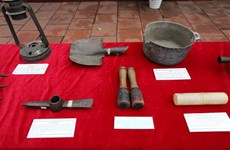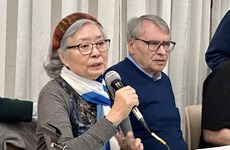Return of floating souls
“I felt it was an obligation that I
could not deny. This seems to me a combination both of my own work as a
writer, and also a way of ending the war for myself and for Homer,”
said American author Wayne Karlin describing his new book “Wandering
souls”.
“I felt it was an obligation that I
could not deny. This seems to me a combination both of my own work as a
writer, and also a way of ending the war for myself and for Homer,”
said American author Wayne Karlin describing his new book “Wandering
souls”.
The book, to be published in the United States this September, tells the story of two drifting souls – that of an American soldier and the Vietnamese military medic who he shot dead during the Vietnam war. He survived the war, but was left with lingering regrets for nearly 40 years before he could return the young Vietnamese soldier’s documents to his family.
Wandering souls
On March 19, 1969, First Lieutenant Homer R. Steedly shot and killed a North Vietnamese soldier named Hoang Ngoc Dam, when they met on a jungle trail. Homer took a diary from the body of the dead soldier, which he subsequently sent to his mother in the US for safekeeping.
Thirty-five years later, Homer rediscovers the forgotten dairy and begins to confront his suppressed memories of the war that defined his life, deciding to return to Viet Nam and meet the family of the man he killed to seek their forgiveness.
While the soul of the Vietnamese soldier wandered in limbo before being brought back to his village one day in 2008, together with his remains, the other soul, that of the American soldier—the soul of a living man--also drifted, clinging on to only one thing – grief.
“For many of those years after the war, Homer was deeply traumatised. When he tried to talk to people, nobody wanted to listen. People would look at him strangely when he wanted to talk about the war,” Wayne Karlin said.
So for a long time he isolated himself and he also engaged in many dangerous sports like caving, parachuting, and motorcycle racing, etc. He also tried to kill himself, Wayne confided.
“The deaths and injuries [that] occurred under my leadership still haunt my memories,” Homer was quoted as saying. “I expect they will be among the memories that flash before my eyes when I lie on my deathbed. Somehow I feel guilty for having come back alive.”
As an artilleryman serving in the US Marine Corps from 1963 to 1967 in Vietnam, author Wayne Karlin said that, for him, the ghosts that visit him, and the obsessions that overtake him from the war are less traumatic because he can write them out instead of keeping everything inside.
“When I went to the war I was totally led to believe that I was helping people who want democracy and to be free of communist aggression. Growing up in the US , we heard the same thing in schools, all the time. And so I believe it,” Karlin said.
“But, when I came, I saw that we were hurting the Vietnamese people by being here more than helping them... I saw that many people were going to die...,” he continued.
Karlin said that when he came home, he started to read as much as he could about Vietnam, to understand how what he saw fit into the larger picture—namely that he and other US soldiers were fighting against people who, in their own view, were fighting for their independence from them. “I wish I were not a part of that [war],” Karlin added.
35 years to end a war When Karlin’s book was finished in 2009, Dam’s remains were brought home and Steedly had fulfilled his wish to pay his respects and light incense at the altar of the Vietnamese soldier he shot. The souls of both the dead and the living men find peace in the end.
Karlin said he wrote the book not only as a writer, but also as “a way of ending the war for myself and for Homer.” However, he said that the work has given his soul no peace, since in order to write it, he had to delve deep into what makes people feel less peaceful on their souls.
As a professor at Southern Maryland College, Karlin is now working to heal the scars left over from the war by leading a group of US students to visit Vietnam to understand more about the country’s history, culture and people.
Also during his trip, he visited two schools which were built in 2005 with funds provided by the Dove Fund supported by US veterans. The schools are located in the villages of Ai Tu and Cam Thanh in Quang Tri province – the former battlefield for himself and his fellow soldiers.
Part of the profits from Karlin’s books have gone to the schools. Before “Wandering souls”, he wrote seven novels and two books of non-fiction about the Vietnam war.
He is also the American editor of the Curbstone Press’s series of books “Voices from Vietnam ” and of various war novels by Vietnamese writers./.
The book, to be published in the United States this September, tells the story of two drifting souls – that of an American soldier and the Vietnamese military medic who he shot dead during the Vietnam war. He survived the war, but was left with lingering regrets for nearly 40 years before he could return the young Vietnamese soldier’s documents to his family.
Wandering souls
On March 19, 1969, First Lieutenant Homer R. Steedly shot and killed a North Vietnamese soldier named Hoang Ngoc Dam, when they met on a jungle trail. Homer took a diary from the body of the dead soldier, which he subsequently sent to his mother in the US for safekeeping.
Thirty-five years later, Homer rediscovers the forgotten dairy and begins to confront his suppressed memories of the war that defined his life, deciding to return to Viet Nam and meet the family of the man he killed to seek their forgiveness.
While the soul of the Vietnamese soldier wandered in limbo before being brought back to his village one day in 2008, together with his remains, the other soul, that of the American soldier—the soul of a living man--also drifted, clinging on to only one thing – grief.
“For many of those years after the war, Homer was deeply traumatised. When he tried to talk to people, nobody wanted to listen. People would look at him strangely when he wanted to talk about the war,” Wayne Karlin said.
So for a long time he isolated himself and he also engaged in many dangerous sports like caving, parachuting, and motorcycle racing, etc. He also tried to kill himself, Wayne confided.
“The deaths and injuries [that] occurred under my leadership still haunt my memories,” Homer was quoted as saying. “I expect they will be among the memories that flash before my eyes when I lie on my deathbed. Somehow I feel guilty for having come back alive.”
As an artilleryman serving in the US Marine Corps from 1963 to 1967 in Vietnam, author Wayne Karlin said that, for him, the ghosts that visit him, and the obsessions that overtake him from the war are less traumatic because he can write them out instead of keeping everything inside.
“When I went to the war I was totally led to believe that I was helping people who want democracy and to be free of communist aggression. Growing up in the US , we heard the same thing in schools, all the time. And so I believe it,” Karlin said.
“But, when I came, I saw that we were hurting the Vietnamese people by being here more than helping them... I saw that many people were going to die...,” he continued.
Karlin said that when he came home, he started to read as much as he could about Vietnam, to understand how what he saw fit into the larger picture—namely that he and other US soldiers were fighting against people who, in their own view, were fighting for their independence from them. “I wish I were not a part of that [war],” Karlin added.
35 years to end a war When Karlin’s book was finished in 2009, Dam’s remains were brought home and Steedly had fulfilled his wish to pay his respects and light incense at the altar of the Vietnamese soldier he shot. The souls of both the dead and the living men find peace in the end.
Karlin said he wrote the book not only as a writer, but also as “a way of ending the war for myself and for Homer.” However, he said that the work has given his soul no peace, since in order to write it, he had to delve deep into what makes people feel less peaceful on their souls.
As a professor at Southern Maryland College, Karlin is now working to heal the scars left over from the war by leading a group of US students to visit Vietnam to understand more about the country’s history, culture and people.
Also during his trip, he visited two schools which were built in 2005 with funds provided by the Dove Fund supported by US veterans. The schools are located in the villages of Ai Tu and Cam Thanh in Quang Tri province – the former battlefield for himself and his fellow soldiers.
Part of the profits from Karlin’s books have gone to the schools. Before “Wandering souls”, he wrote seven novels and two books of non-fiction about the Vietnam war.
He is also the American editor of the Curbstone Press’s series of books “Voices from Vietnam ” and of various war novels by Vietnamese writers./.













